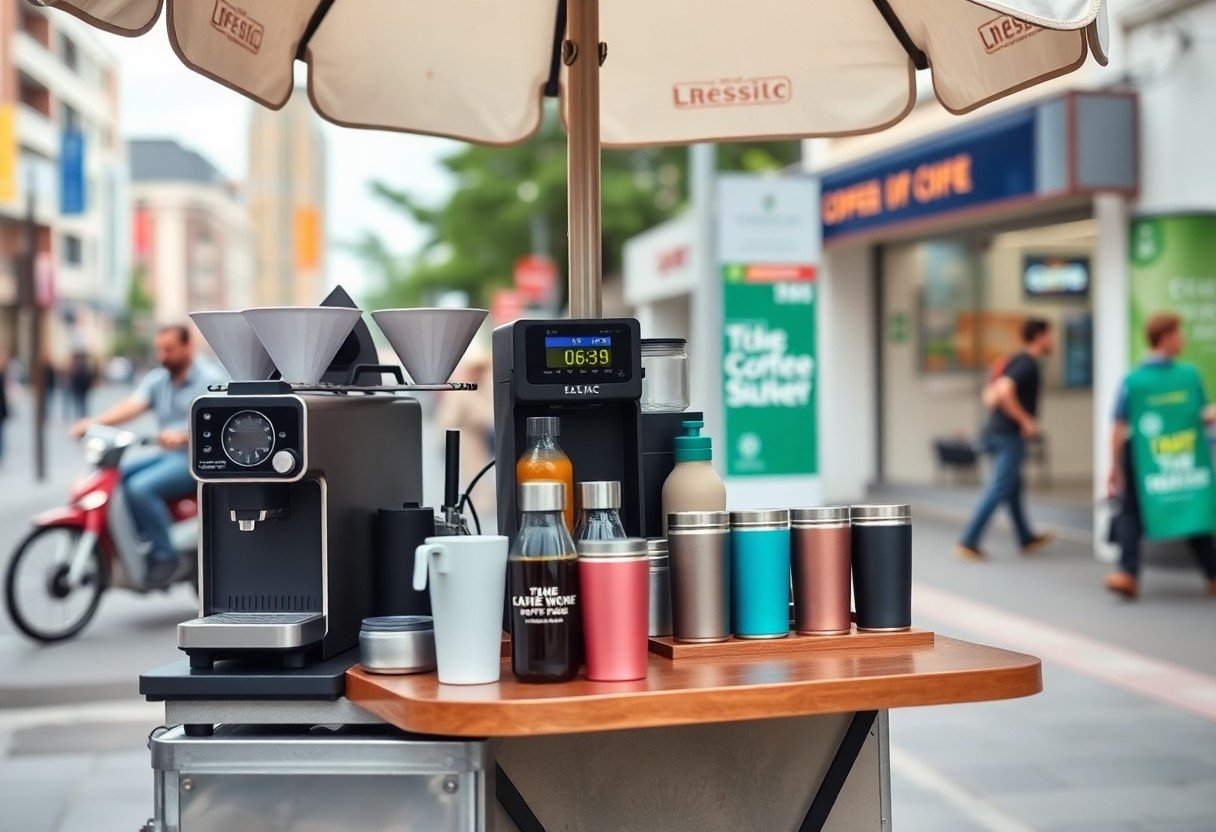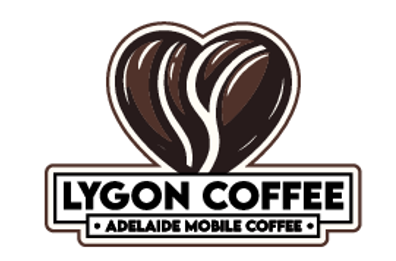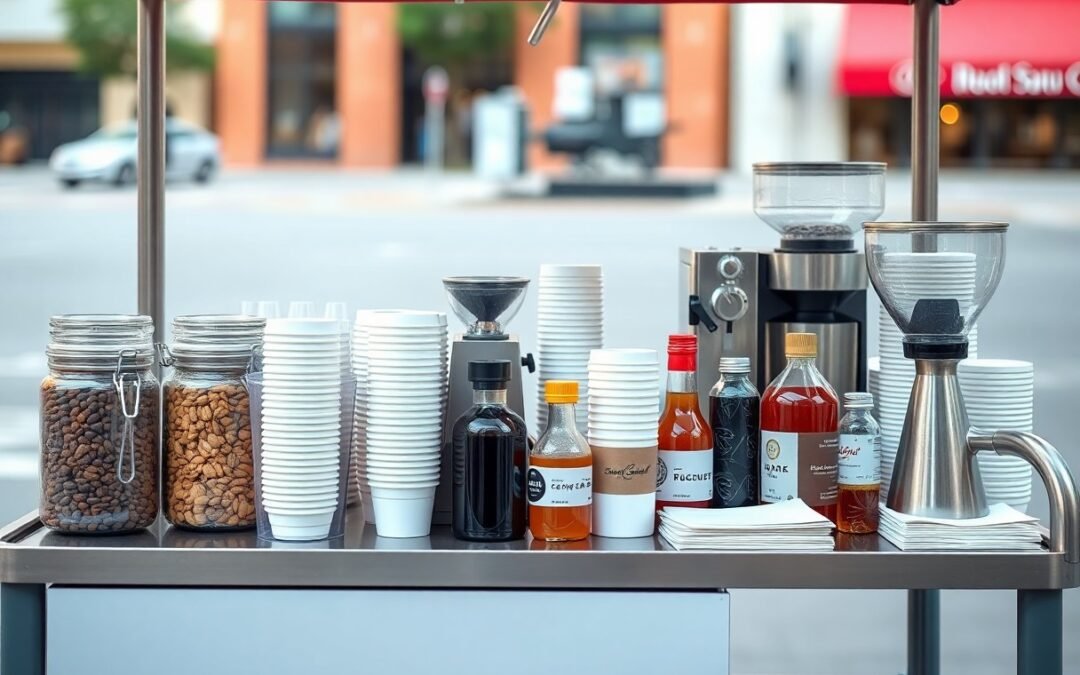Most successful mobile coffee businesses thrive on having the right supplies to deliver excellent service and quality beverages. As you initiate on your coffee venture, it’s vital to equip yourself with vital tools and ingredients that enhance your operations and satisfy customer preferences. Whether it’s your brewing equipment or payment processing solutions, understanding what to include in your inventory will significantly impact your business’s efficiency and success. This guide will help you identify the must-have supplies that can elevate your mobile coffee experience.

Must-Have Coffee Equipment for Mobile Operations
To thrive in the competitive mobile coffee market, equipping your setup with the right coffee machines is vital. High-quality brewing equipment not only enhances the flavor of your beverages but also improves efficiency during service. Consider the space, volume, and specific offerings when selecting your machinery. The choices can range from compact espresso machines perfect for high-demand situations to reliable drip brewers for a straightforward coffee experience.
High-Quality Coffee Machines: Choosing Between Espresso and Drip
Your choice between espresso and drip coffee machines hinges on your menu and target audience. Espresso machines provide versatility with various drink options, appealing to a more sophisticated palate. In contrast, drip machines are easier to maintain and can churn out larger quantities, making them suitable for events where speed is crucial. Assess your typical serving volume, potential space constraints, and customer preferences to make an informed decision.
Essential Brewing Accessories: Grinders, Scales, and More
Brewing accessories enhance the coffee-making process, ensuring consistency and quality in every cup. Investing in a high-quality grinder is necessary for preserving the freshness and aroma of your beans, while precision scales help you measure ingredients accurately. Additionally, tools like tampers, pitchers for milk, and cleaning supplies are crucial to maintaining your equipment and workflow efficiency.
Choosing a burr grinder over a blade model will yield a more uniform grind size, crucial for extracting rich flavors. For scales, opt for those that can measure in both grams and ounces, allowing you to cater to different brewing methods. Having a calibrated tamper ensures that your espresso is consistently compacted for optimal extraction, while various milk frothing pitchers can improve your presentation for lattes and cappuccinos. This arsenal of brewing accessories ultimately enhances your capability to deliver high-quality beverages consistently, attracting loyal customers to your mobile coffee shop.
Portable Infrastructure: Setting the Stage for Success
Creating the right portable infrastructure helps ensure efficient service and customer satisfaction. A well-planned layout maximizes space and workflow, while also considering factors like mobility and accessibility. By selecting the appropriate equipment and cart design, you can streamline operations. Whether it’s your coffee machine, serving counter, or storage, everything should be easily transportable yet robust enough to endure frequent relocations, enabling you to set up quickly at any location.
Mobile Coffee Carts vs. Food Trucks: Pros and Cons
The choice between mobile coffee carts and food trucks significantly impacts your business model. Each option has its unique advantages and limitations to consider.
Pros and Cons
| Mobile Coffee Carts | Food Trucks |
|---|---|
| Lower initial investment | More space for equipment and inventory |
| Highly portable and easy to set up | Ability to serve a wider menu |
| Less complex regulations | Can generate higher revenue |
| Flexibility in location | Protection from weather elements |
| Lower operational costs | Enhanced branding visibility |
| Requires manual labor for transport | Higher maintenance and fuel expenses |
| Limited storage space | More initial paperwork for permits |
| Ideal for events or festivals | Can operate as a mobile cafe |
| Easier to customize | Large customer capacity |
| Limited seating options | More complex operational logistics |
Required Permits and Compliance: Navigating Local Regulations
Launching a mobile coffee business involves understanding and adhering to local regulations, which can include health permits, business licenses, and food handling permits. Each municipality has specific requirements, and failing to secure the necessary permits could lead to fines or shutdowns. It’s necessary to research your local laws, including zoning regulations and health department standards, to operate legally.
Engaging with local government agencies provides clarity on the requirements, which varies greatly depending on your location. Some areas may require extensive documentation, including menu details, food safety certifications, and proof of liability insurance. Consider consulting with fellow business owners in your area or local food truck associations to streamline the process. Moreover, staying informed about changes in regulations ensures ongoing compliance, helping you avoid potential setbacks and ensuring a sustainable business model.
Impactful Branding Essentials for Stand-Out Visibility
Effective branding not only sets you apart but also creates lasting impressions on customers. A strong visual identity—rooted in a memorable logo, cohesive color scheme, and unique design elements—can establish recognition and foster loyalty. Incorporate your brand story into every touchpoint, from your business cards to your packaging. This consistent branding enhances visibility, making it easier for customers to find and engage with your mobile coffee business in a crowded market.
Designing Eye-Catching Signage and Menus
Signage and menus serve as your business’s first impression, so they must be designed with attention to detail. Use vibrant colors and bold fonts to draw in passersby and ensure that your offerings are easy to read and visually appealing. Incorporate images of your drinks and snacks to entice customers, and consider adding QR codes for quick access to your social media or online menu for easy engagement.
Leveraging Social Media Tools for Engagement and Promotion
Social media platforms are invaluable for building community and promoting your mobile coffee brand. Utilize Instagram and Facebook to showcase your creations through high-quality images and engaging stories. Post regularly with updates on locations, special offers, and behind-the-scenes content to create a connection with your audience. Engaging with followers through polls, giveaways, and user-generated content fosters a sense of belonging and encourages repeat visits.
Implementing strategic social media campaigns can significantly boost your brand visibility and customer interaction. For instance, creating a hashtag for your business allows customers to share their experiences, expanding your reach organically. Consider hosting themed events or limited-time promotions advertised exclusively through social media to encourage engagement. Track metrics such as likes, shares, and comments to understand what resonates with your audience, allowing you to refine your approach and maximize effectiveness over time.
Inventory Management: Stocking Your Mobile Coffee Shop
Effective inventory management ensures your mobile coffee business runs smoothly and profitably. You need to regularly assess your stock levels, setting reorder points for crucial items to keep your offerings consistent. A well-organized inventory not only enhances customer satisfaction but also minimizes the risk of running out of popular items during peak hours.
Sourcing Quality Beans and Other Supplies
Finding top-notch coffee beans and supplies will elevate your mobile coffee experience. Partner with reputable local roasters or specialty suppliers who prioritize freshness and sustainability. Establish relationships that allow you to source seasonal beans while keeping an eye on quality. This not only enhances your product but enhances your brand’s integrity and customer loyalty.
Inventory Tracking: Avoiding Shortages and Waste
Efficient inventory tracking enables you to minimize waste and avoid running out of popular items. Implement a digital system to monitor stock levels in real-time. Analyze your sales data to predict demand accurately, allowing you to adjust orders accordingly. Regular audits will help you identify slow-moving items, making it easier to adjust your menu or promotions to reduce excess.
Using an inventory management system not only streamlines your processes but enables smart decision-making based on data. For example, tracking sales during different seasons can reveal trends, allowing you to stock seasonal items optimally. By integrating user feedback and consumption patterns, you can further refine your offerings to meet customer preferences and keep your costs low. Adopting these methods ensures you maintain an efficient operation, maximizing profitability while delighting your customers.
Customer Experience: Enhancing Service in a Mobile Environment
Tailoring the customer experience in a mobile coffee business elevates service quality and fosters loyalty. Providing quick, efficient service while maintaining a personal touch sets you apart. Engage with your customers through friendly interactions, remember their preferences, and offer personalized drink suggestions. These small gestures create a memorable experience, encouraging repeat visits, even in fast-paced settings.
Creating a Welcoming Atmosphere on the Go
A friendly, inviting atmosphere enhances customer interactions, even in mobile setups. Use bright colors, easy-to-read menus, and attractive signage to draw attention. Play soft background music and use friendly, approachable staff to create an inviting ambiance. Offering comfortable seating options, such as stools or small tables, can also encourage customers to linger, enhancing their overall experience.
Offering Unique Products: Seasonal and Local Specials
Incorporating seasonal and local specialties into your menu not only differentiates your offerings but also highlights community engagement. Promote beverages made from locally sourced ingredients, or create seasonal drinks that reflect current trends. For instance, a pumpkin spice latte in the fall or a refreshing iced lavender drink in summer can draw in curious customers. This approach keeps your menu exciting and encourages patrons to return regularly to discover what’s new.
Offering unique products tied to local vendors can significantly enhance your appeal. Collaborate with nearby bakeries for fresh pastries or feature local farmers’ produce in your seasonal drinks. Highlighting these partnerships on your social media boosts local engagement and promotes community pride. Seasonal specials not only attract attention but also create a sense of urgency, with customers eager to try drinks that are only available for a limited time. This strategy not only drives sales but also builds a loyal customer base eager for your next unique offering.
Conclusion
Hence, equipping your mobile coffee business with imperative supplies, such as high-quality coffee beans, reliable brewing equipment, and effective branding materials, will significantly enhance your service and customer satisfaction. Always prioritize having the right tools on hand, including portable grinders, eco-friendly cups, and efficient payment systems, to streamline your operations. By investing in these items, you ensure a professional experience that attracts repeat customers and fosters a successful venture in the competitive coffee market.
FAQ
Q: What equipment is vital for brewing high-quality coffee?
A: The vital equipment includes a commercial espresso machine, a grinder, pour-over setup, and a coffee brewer. These tools help in delivering a consistent and flavorful coffee experience.
Q: What types of coffee beans should I stock?
A: It’s advisable to stock a variety of coffee beans, including specialty blends, single-origin options, and decaf. This range caters to diverse customer preferences and enhances your coffee menu.
Q: Are there specific supplies needed for food items?
A: Yes, you should consider having supplies such as pastries, snacks, and dairy alternatives (like almond or oat milk). These items complement your coffee offerings and attract more customers.
Q: What kinds of cups and lids should I use for serving coffee?
A: Eco-friendly disposable cups and lids are popular choices. Additionally, consider having reusable options available for customers who prefer to minimize waste.
Q: What inventory management tools should I utilize?
A: Implementing an inventory management system or app is recommended. This helps in tracking supplies, managing orders, and preventing shortages of vital items for your mobile coffee business.

